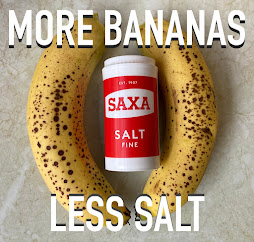Primary aldosteronism, also known as Conn's, is a condition in which your adrenal glands produce too much aldosterone. Excess aldosterone can cause your body to retain sodium and lose potassium, and that can be bad for your body, particularly your heart. A common symptom of primary aldosteronism is high blood pressure that doesn't come down even when you take blood pressure medication.
Until recently, primary aldosteronism was thought to be rare, but new studies suggest it is the most common cause of treatment-resistant high blood pressure, sometimes called essential hypertension. (See the Primary Aldosteronism Foundation website for the numbers.)
If you have high blood pressure and your doctor tells you to eat more potassium-rich foods—such as bananas—because your potassium levels are low, and to lay off the salt because your sodium is high, that could well be a sign you have primary aldosteronism.
(Disclaimer: I am not a doctor and you should not read this blog as medical advice; I am just passing on my experience being treated for primary aldosteronism and what I have learned along the way.)
As I found out to my cost, untreated primary aldosteronism can lead to elevated blood pressure and increase your risk of stroke, heart disease, and atrial fibrillation. Finding out that I had primary aldosteronism in 2013 changed my life, mainly in good ways. Since then I have shared my story to help anyone who might benefit from hearing it.
Fortunately, I had a form of hyperaldosteronism that can be cured with surgery, namely an adrenalectomy. Unfortunately, doctors were slow in diagnosing my PA, so by the time it was confirmed, PA had caused irreversible damage to my heart, leaving me with long-standing persistent atrial fibrillation (LSPAF). At the end of this blog post you will find links to my articles about my heart problems, aldosteronism, and adrenalectomy.
Primary aldosteronism is not rare!
If you or someone you love is taking tablets for high blood pressure, now would be a good time to learn more about primary aldosteronism or Conns, "the most common specifically treatable and potentially curable form of hypertension" (BMJ, 2021). For more information visit the Primary Aldosteronism Foundation website.
- June 4, 2013: The adrenalectomy story begins...Sorry I’ve been out of touch (my adrenal adenoma is to blame)
- June 5, 2013: The Conn is on...Cobb’s got Conn’s? Probably, but I go through Adrenal Vein Sampling (AVS) to be sure
- July 13, 2013: A geek worried about a robot? Robot or not? Robotic surgery and risk, part one
- August 25, 2013: Success is in sight! Adrenalectomy, from pain to promising signs of progress
- January 13, 2019: Primary aldosteronism update: High blood pressure cure? For some, this treatment is not a conn
